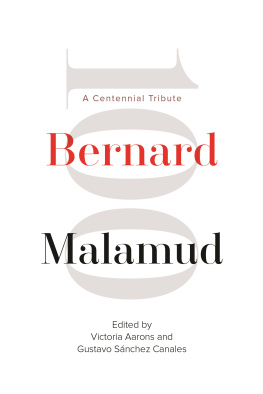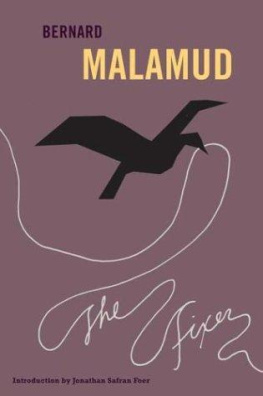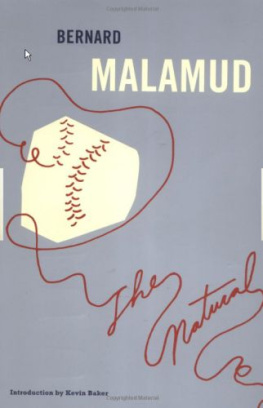Victoria Aarons - Bernard Malamud: A Centennial Tribute
Here you can read online Victoria Aarons - Bernard Malamud: A Centennial Tribute full text of the book (entire story) in english for free. Download pdf and epub, get meaning, cover and reviews about this ebook. year: 2013, publisher: Wayne State University Press, genre: Art. Description of the work, (preface) as well as reviews are available. Best literature library LitArk.com created for fans of good reading and offers a wide selection of genres:
Romance novel
Science fiction
Adventure
Detective
Science
History
Home and family
Prose
Art
Politics
Computer
Non-fiction
Religion
Business
Children
Humor
Choose a favorite category and find really read worthwhile books. Enjoy immersion in the world of imagination, feel the emotions of the characters or learn something new for yourself, make an fascinating discovery.
- Book:Bernard Malamud: A Centennial Tribute
- Author:
- Publisher:Wayne State University Press
- Genre:
- Year:2013
- Rating:5 / 5
- Favourites:Add to favourites
- Your mark:
- 100
- 1
- 2
- 3
- 4
- 5
Bernard Malamud: A Centennial Tribute: summary, description and annotation
We offer to read an annotation, description, summary or preface (depends on what the author of the book "Bernard Malamud: A Centennial Tribute" wrote himself). If you haven't found the necessary information about the book — write in the comments, we will try to find it.
Bernard Malamud: A Centennial Tribute — read online for free the complete book (whole text) full work
Below is the text of the book, divided by pages. System saving the place of the last page read, allows you to conveniently read the book "Bernard Malamud: A Centennial Tribute" online for free, without having to search again every time where you left off. Put a bookmark, and you can go to the page where you finished reading at any time.
Font size:
Interval:
Bookmark:

2016 by Wayne State University Press, Detroit, Michigan 48201. All rights reserved. No part of this book may be reproduced without formal permission. Manufactured in the United States of America.
20 19 18 17 16 5 4 3 2 1
ISBN 978-0-8143-4114-8 (paperback) / ISBN 978-0-8143-4115-5 (e-book)
Library of Congress Control Number: 2016930473

Designed and typeset by adam b. bohannon
Composed in Adobe Caslon
Wayne State University Press
Leonard N. Simons Building
4809 Woodward Avenue
Detroit, Michigan 48201-1309
Visit us online at wsupress.wayne.edu
For our children,
Aaron and Gabriel
and
Federico and Micaela
A smart man hears one word but he understand[s] two.
Bernard Malamud, The Assistant
by Paul Malamud
by Paul Malamud
VICTORIA AARONS
LEAH GARRETT
HOLLI LEVITSKY
ANDREW M. GORDON
TIMOTHY PARRISH
JESSICA LANG
VICTORIA AARONS
GUSTAVO SNCHEZ CANALES
PILAR ALONSO
GUSTAVO SNCHEZ CANALES
MARTN URDIALES SHAW
RMI ASTRUC, TRANSLATED BY ALAN ASTRO
TILL KINZEL
EMILIO CAADAS RODRGUEZ
FLIX MARTN GUTIRREZ
ARISTI TRENDEL
THEODORA TSIMPOUKI
Bernard Malamud (19141986), consummate storyteller, artful craftsman, and exacting stylist, is generally considered not only one of the three most influential postwar American-Jewish writers but also a writer holding a central place in the canon of twentieth-century American letters. Malamud came to prominence at an important moment in American social, political, and cultural history, writing at a time that saw dramatic changes in both Americas self-assessment in the aftermath of World War II and in its ability to assimilate diverse sectors of its population. Along with the novelists Philip Roth and Saul Bellow, Bernard Malamud brought to life a decidedly American-Jewish protagonist and a newly emergent Jewish voice that came to define American letters and influence American writers for over half a century, an influence that continues. The Malamudian voice and characteristic urban landscape that define his fiction speak to the changing ethos in American life and thought at this pivotal, mid-twentieth-century moment in American history. Malamuds literary oeuvre reflects a struggle to achieve order in both life and literature, as well as a deep appreciation for the supple and elastic forms of the written word (Malamud, introduction vi). Malamuds legacy continues to be a hallmark of American literature, with the very best of his workthe novels and short stories that create the felt conditions of what it means human (Idiots First, Stories 44)an expression of the deep investment in an ethical life and in the rigors of the human sentence (Malamud, introduction xii).
While Malamud remains a major, formative voice in American letters, recent years have shown an emergent, burgeoning interest in Malamud among European scholars, who regard Malamud with growing interest not only as a central American voice but also as a writer whose fiction opens itself up to an exploration of stylistic technique, narrative voice, and the making of character. Thus, in recognition of this major voice in American literature, the editors of this volume have brought together both North American and European scholars in an attempt to show the range and depth of the possibilities for Malamud studies in the twenty-first century. In celebration of the one hundredth anniversary of Malamuds birth and in recognition of the thirtieth anniversary of Malamuds death, the editors of this tribute have attempted to bring together under one title a variety of approaches and responses to Malamuds central, defining works of fiction.
We have intended the essays gathered here to play off one another, to show differences as well as overlapping concerns and interests. In engaging scholars from the United States and abroad, we hope to establish a dialogue between the critical, traditional study of Malamud in America and the newly emerging one in Europe. Malamuds work lends itself to this cross-cultural engagement. Very much in the tradition of twentieth-century American writers, Malamud traveled to Europe, centering many of his stories there, a fertile context for looking back to the origins of America and its comparative cultural successes and failures. Many of Malamuds stories are set in Europe, especially the Italian stories. Europe was, for Malamud, a landscape for his characters self-assessment against the backdrop of history. In, for example, The Last Mohican, Malamuds recurring protagonist, Fidelman, in Rome, standing in the Eternal City, gazing at the remains of the Baths of Diocletian, whispers to himself, Imagine all that history (Complete 200). Europe figures in the Fidelman stories as a place of possibilities, opportunities, and self-reinvention. Abroad, Fidelman experienced the sensation of suddenly seeing himself as he was (201). And Henry Levin, in the story The Lady of the Lake, travels abroad seeking romance.... He liked the sense of foreignness of the cityof things different, anything likely to happen (Complete 221). Paul Malamuds poem Mediterranean, which is a part of this collection, speaks to his fathers affinity and deep appreciation for a landscape and a history so different from his own, a poor Jew from Brooklyn who had made good, walking under the olive trees.
The editors have arranged this book in an attempt to illustrate the richness and complexity of Malamuds work as a way of paying tribute to the writer and to the subtle utterance and perfection of the written word that is such a fundamental feature of Malamuds craft. Our hope is that including scholarly approaches from a range of countriesthe United States, Spain, France, Germany, Italy, and Greecewill multiply the possibilities of study and appreciation of this important author and his work. And while our intention, initially, was to show an understanding of Malamud from two different perspectivesU.S. and Europeanthe exchange among scholars demonstrates the enormous breadth and complexity in such a diverse perspectival reach. For ease of reading, we have structured this book in two parts: U.S. and European Voices. Each is introduced separately in order to set up, in general terms, the direction and focus for the evolving perspectives. What we find in such a dialogue is a kind of chiastic exchange, reflecting one of Malamuds major literary tropes, a relationship that has at its center the experience of an essential connection and consanguinity.

(Address delivered at City College, New York, May, 2013)
Dad was known as a short-story writer and a novelist. The peak of his career was between the early 1960s and 1980 or so. He was known for his short stories, which began to appear in Commentary, the literary magazine, in the 50s. He was also known for his novels, such as the baseball yarn The Natural and The Assistant. The latter book was based in part on his own fathers circumstances as an impoverished Jewish immigrant grocer living in Brooklyn, during the Great Depression. In the 60s, Dad wrote The Fixer, set in tsarist Russia, dealing in a fictional manner with the anti-Semitism of that time and place. A number of his books became best sellers, and most have been made into movies, including, famously,
Next pageFont size:
Interval:
Bookmark:
Similar books «Bernard Malamud: A Centennial Tribute»
Look at similar books to Bernard Malamud: A Centennial Tribute. We have selected literature similar in name and meaning in the hope of providing readers with more options to find new, interesting, not yet read works.
Discussion, reviews of the book Bernard Malamud: A Centennial Tribute and just readers' own opinions. Leave your comments, write what you think about the work, its meaning or the main characters. Specify what exactly you liked and what you didn't like, and why you think so.











